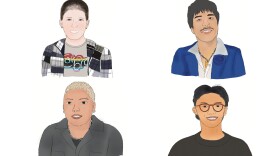WUNC’s Youth Reporting Institute wraps up its summer program this week and the offerings from this year’s cohort reflect many of the complex problems our nation has been grappling with — immigration, LGBTQ rights and mass shootings.
16-year-old Amanda Tsuetaki joins host Frank Stasio to share the story of her grandmother who spent much of her life silent about the fact that she had been in a Japanese internment camp. Kayla Beckett’s story celebrates the LGBTQ pride she experienced when attending her first drag show, while also lamenting the loss of the spiritual community that she believed would not accept her. Emma Pollard spent much of her childhood trying to recover from the Sandy Hook school shooting and was re-traumatized by the Parkland shooting. Her work shares the long road to recovery.
Youth Reporting Institute Director Kamaya Truitt-Martin joins host Frank Stasio to talk about the students, their stories and the program’s objectives. The institute hosts a listening party tonight at 7 p.m. at Motorco in Durham. The free event is open to the public and features the stories produced by this year’s team of reporters.
Interview Highlights
Pollard on deciding to do a story on her experience after Sandy Hook:
With everything that’s been going on recently, with all the mass shootings we’ve seen, I think it’s important to find a connection to people that are victims of it instead of focusing on the perpetrator ... The longer-term impacts are overlooked by everyone in the media.
Tsuetaki on discovering her grandmother’s history:
She hadn’t told us about her Japanese internment until I was in middle school. And she’s always been a very bright and shiny person to me. She’s a big role model in my life, so when my brother was at the dinner table talking about WWII and not telling her part of the story because he was only talking about the fighting overseas, she waited and then told us about her life in the internment camp.
Beckett on her struggle with acceptance at her church:
I don’t really think I’m going to go back to my church. I love the people there dearly, but I also realize that there’s some change that they are unwilling to make right now and that’s problematic to me personally. So [I’m] not going to say: Don’t go to church. I just know I’m not going to my church.













